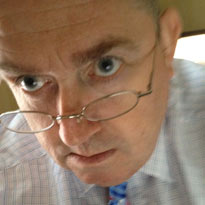Joe’s view of lava lamps (and the Great North Care Record)
- 3 March 2016

It was my privilege recently to be invited to speak at the launch meeting of the Dorset Care Record.
The Dorset Care Record is the latest in an increasingly distinguished line of local integrated digital care record projects; all of which owe something to the Hampshire Health Record.
In the hall were a hundred or so Dorset clinical and IT leaders, all committed to making the patient’s important health information available at the point of need. It was a wonderful occasion with a room full of wonderful people.
Poole in Dorset is – of course – as you know – the birthplace of the lava lamp. My lava lamp went with me to University in 1980 where it transformed the sterile concrete cell of my student accommodation into an exotic and occasionally sexy bachelor pad.
The lamp is basically a glass bottle filled with oil and wax. When turned on, the heat from an incandescent lightbulb warms the big blob of wax until it breaks into smaller blobs. These then rise through the oil, cooling as they go, so that they sink and fall back to the big blob in the bottom. They produce an interesting lighting effect in the room as they churn.
The day after I unpacked and deployed my lava lamp at Nottingham University, I went to Queen’s Medical Centre for my first day of lectures. The local MP, Ken Clarke, had just been appointed as a junior health minister; and despite his recent elevation he turned up to address the new intake of medical students. My very first health minister.
The NHS as lava lamp
The health service often appears to operate on “the lava lamp principle”. It is constantly changing. Constantly being reorganised.
Sometimes, it is the big blob of central control (National Programme for IT, everyone) and sometimes it is much smaller blobs (GP fundholding or digital road maps). The heat that drives the NHS is, of course, politics. Each health minister wants to make their mark, and they often seek to do it by changing the “blob size” of the organisational units of the service.
Remember district health authorities? Area health authorities? Regional health authorities? Not to mention the continuous merging of NHS trusts, PCTs and CCGs.
All systems have a natural oscillation, but the more political heat you apply, the more rapidly those oscillations occur. I have served the NHS under the following health ministers: Fowler, Moore, Clarke, Waldegrave, Bottomley, Dorrell, Dobson, Milburn, Hewitt, Johnson, Burnham, Lansley and Hunt. Average length of stay 22 months.
Think patient
People like me, who have been committed to the NHS for 30 years or more, understand that as public servants our loyalty is to the public rather than to any authority or employer.
We understand that organisational changes are continuous and, therefore, we seek to build relationships in our geographies. We seek to link up with the people we know are likely to survive any reorganisation and likely to be doing roughly the same job in roughly the same area over the years.
These personal relationships are built on trust and have allowed the development of a number of integrated digital care record projects.
Dorset is just embarking on its journey, spurred on by people who can leave organisational self-interest at the door. Bristol, Leeds, Liverpool and Northern Ireland have all shown us what can be achieved in terms of connecting care what everybody is prepared to put the patient first.
A minister who gets it
In the North East of England, we have a long and proud history of being at the cutting edge of technology. We’ve seen everything from George Stevenson’s ‘Rocket’, which ushered in the age of railways, to Charles Hesterman Merz, the father of the National Grid.
Last week, George Freeman, the life sciences minister, addressed a Digital Health Leadership Summit at Coombe Abbey in Coventry. He spoke about “laying the Railtrack of information” to make the NHS a world leader in the delivery of healthcare and in health care research.
Download video: MP4 format | Ogg format | WebM format
He couldn’t attend in person, but appeared by video recording. It’s the first time I’ve ever seen an NHS audience spontaneously applaud a video recording let alone by a Tory minister. He clearly gets it.
This provoked much debate amongst the knowledgeable audience of chief information officers, chief clinical information officers and senior NHS executives.
We talked about the Goldilocks principle for local digital integrated care records projects. How big is too big? How small is too small? What should the centre be doing and what should be left for localities to decide?
In terms of digital road maps, we have been allowed to pick our own footprint. Now have to merge these footprints to produce sustainability and transformation plans. Some wished for the good old days when the centre would tell us how we are to be organised, others welcomed the freedom.
The Great North Care Record
In the North East, we are a practical and friendly lot and we have been building a regional interoperability community over the last few years (going to the pub, building a Clinical Health Informatics Network, going to the pub…).
We have done this, the knowledge that the lava lamp will continue to bubble, but that the good relationships between clinicians and local IT leaders might eventually lead to what we had begun to call the ‘Great North Care Record’.
The GNCR is currently just an idea, predicated on two principles. Firstly, we would like to make this region one of the safest places in the world to get sick. And secondly, we would like to make this region the best place in the world to do research.
The beauty of the GNCR is that its geography is deliberately vague. It can start small and get as big as the citizens want.
The GNCR will have game changing levels of engagement with the citizen and will allow them to set their privacy sliders exactly where they want them.
It won’t be easy to establish the GNCR, but because of the work already done in Hampshire, Bristol, Leeds, and the rest we know it can be done.
The technological real estate in the North East is challenging and includes Cerner, RiO, Meditech, Orion, EMIS, TPP and others, with no dominant supplier.
We will need something that connects everything together in an open way which chimes with The Newcastle Declaration. Consequently, if we can make it work here, it can be made to work anywhere.
Like the railways and the National Grid, you have to start somewhere. Is there a moderately well-heeled sponsor out there who wants to change the world?
 |
Joe McDonaldJoe McDonald is a practising NHS consultant psychiatrist and CCIO at Northumbria, Tyne and Wear NHS Foundation Trust. He is also chair of the CCIO Network. Follow him on twitter @CompareSoftware |
 |




